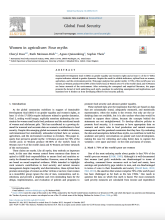/ library resources
Showing items 1 through 9 of 40.Land tenure, or access and rights to land, is essential to sustain people’s livelihoods. This paper looks at how farm households perceive land tenure (in)security in relation to food (in)security, and how these perceptions evolve throughout different policy periods in Laos.
Land use models play an important role in exploring future land change dynamics and are instrumental to support the integration of knowledge in land system science.
Women's empowerment is considered a ‘prerequisite’ to achieving global food security. Gender systems, however, are diverse and complex. The nature and extent of gender inequity and the conditions necessary to empower women vary across countries, communities and regions.
Studies of land property rights usually focus on tenure security and transfer rights. Rights to determine how to use the land are regularly ignored. However, user rights are often limited.
In the early 1990s, the Lao government launched a nationwide Land Use Planning and Land Allocation programme in a bid to foster socio-economic development while protecting the environment. However, the programme has long been perceived as having negative impacts on rural livelihoods.
The paper critically engages with sustainable development goal targets (SDG-2- Target 2.3; SDG-5) to examine how and why large-scale agricultural land acquisitions modify the social relations of women’s food access.
The rise of new powers in development has generated much debate on the extent to which South–South Cooperation (SSC) constitutes a new paradigm of development more relevant to African needs or a disguise for a new form of imperialism.
Pagination
Land Library Search
Through our robust search engine, you can search for any item of the over 73,000 highly curated resources in the Land Library.
If you would like to find an overview of what is possible, feel free to peruse the Search Guide.





